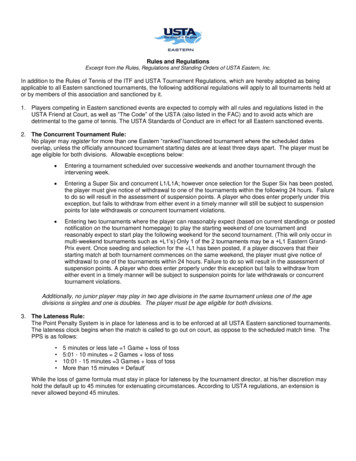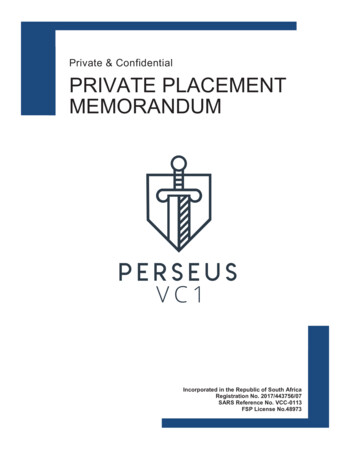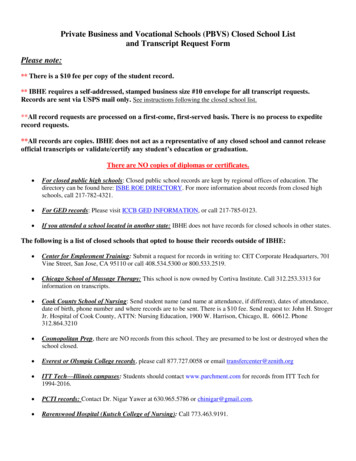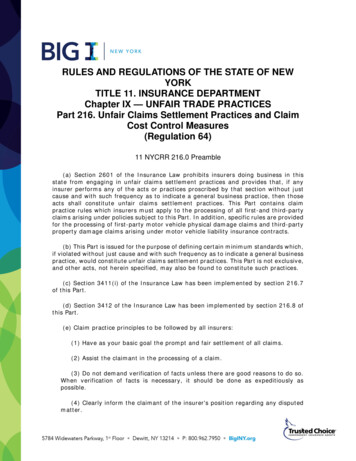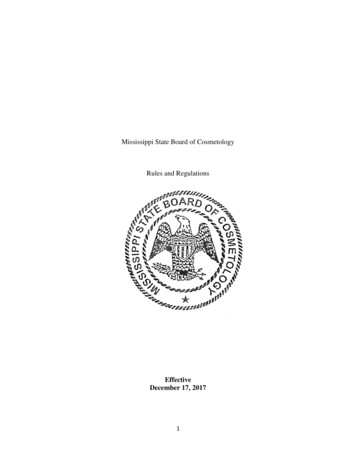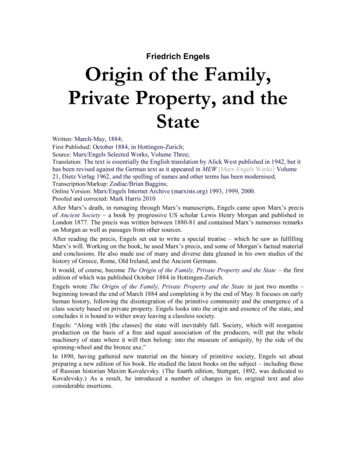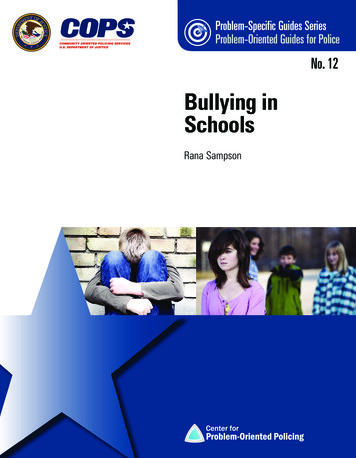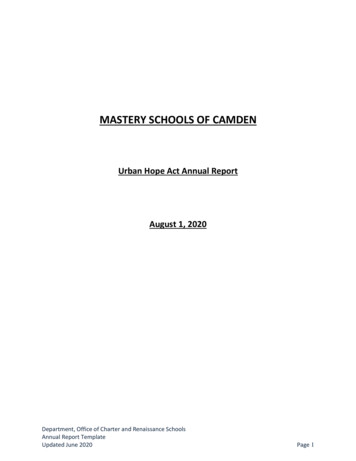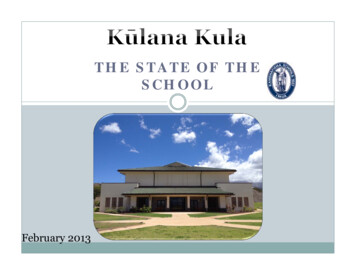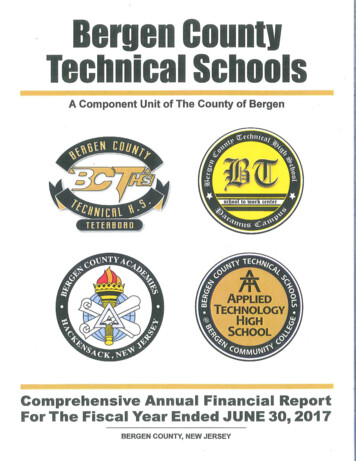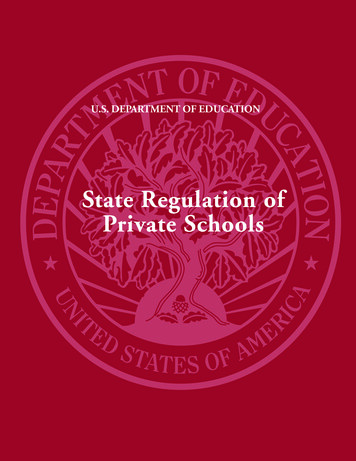
Transcription
U.S. Department of EducationState Regulation ofPrivate Schools
State Regulation of Private SchoolsU.S. Department of EducationOffice of Innovation and ImprovementOffice of Non-Public Education2009
The content of this report does not necessarily reflect the view or policies of the U.S.Department of Education, nor does the mention of trade names, commercial products,curricula, and curricular materials and approaches, or organizations imply endorsementby the U.S. government. This publication also contains Internet Uniform ResourceLocators (URLs) for information created and maintained by private organizations. Thisinformation is provided for the reader‘s convenience. The U.S. Department of Educationis not responsible for controlling or guaranteeing the accuracy, relevance, timeliness, orcompleteness of outside information mentioned in this report. Further, the inclusion ofinformation or a URL does not reflect the importance of the organization, nor is itintended to endorse any views expressed, or products or services offered.U.S. Department of EducationArne DuncanSecretaryOffice of Innovation and ImprovementJames H. SheltonAssistant Deputy Secretary for Innovation and ImprovementOffice of Non-Public EducationJack KlenkDirectorJuly 2009This report is in the public domain. Authorization to reproduce it in whole or in part isgranted. While permission to reprint this publication is not necessary, the citation shouldbe: U.S. Department of Education, Office of Innovation and Improvement, StateRegulation of Private Schools, Washington, D.C., 2009.This report is available on the Department‘s Web site at: ml .ii
ContentsAcknowledgements . vIntroduction . 1ALABAMA . 3ALASKA . 8ARIZONA. 13ARKANSAS . 18CALIFORNIA . 23COLORADO . 31CONNECTICUT . 36DELAWARE . 42DISTRICT OF COLUMBIA . 46FLORIDA . 51GEORGIA. 57HAWAII . 63IDAHO . 70ILLINOIS . 75INDIANA . 82IOWA . 89KANSAS. 96KENTUCKY. 103LOUISIANA . 108MAINE . 116MARYLAND . 124MASSACHUSETTS. 131MICHIGAN . 136MINNESOTA . 143MISSISSIPPI . 150MISSOURI . 154MONTANA . 158NEBRASKA . 163NEVADA . 169NEW HAMPSHIRE . 176NEW JERSEY . 182NEW MEXICO . 188NEW YORK . 192NORTH CAROLINA . 200NORTH DAKOTA . 207OHIO. 212OKLAHOMA . 219OREGON . 225PENNSYLVANIA . 229PUERTO RICO . 238RHODE ISLAND . 242SOUTH CAROLINA. 247iii
SOUTH DAKOTA . 252TENNESSEE . 260TEXAS . 267UTAH . 272VERMONT . 277VIRGIN ISLANDS . 285VIRGINIA . 288WASHINGTON . 294WEST VIRGINIA . 301WISCONSIN . 306WYOMING . 313APPENDIX A: TABLES ON STATE REQUIREMENTS FOR PRIVATE SCHOOLS. 317APPENDIX B: TABLE ON STATE REQUIREMENTS FOR HOMESCHOOLS . 333APPENDIX C: LEGAL HISTORY OF THE REGULATION OF PRIVATE SCHOOLS(2000) . 335iv
AcknowledgmentsSpecial thanks are extended to the many individuals who assisted in the work of thisreport. State liaisons from all 50 state departments of education, the District of Columbia,Puerto Rico, and the Virgin Islands (see below), worked to ensure the informationprovided here is as accurate and up-to-date as possible. Without their assistance, thisinformation could not have been provided to our readers.Thanks to James Shelton, assistant deputy secretary for innovation and improvement, theprincipal office within which the Office of Non-Public Education is located. We alsothank our colleagues in U.S. Department of Education who reviewed this document.Special thanks to Erin McHugh of the Office of Non-Public Education for managing thisproject, contacting the states, and editing this document.Our readers are cautioned that in reviewing any particular legal questions, the underlyingstate constitutions, laws and relevant court decisions should be consulted. Nothing in thisstudy reflects the position of the U.S. Department of Education as to the meaning oreffect of any state legal requirement.Jack KlenkDirector, Office of Non-Public EducationU.S. Department of EducationAlabama Department of EducationAlaska Department of Education and Early DevelopmentArkansas Department of EducationArizona Department of EducationCalifornia Department of EducationColorado Department of EducationConnecticut Department of EducationDelaware Department of EducationDistrict of Columbia, Office of State SuperintendentFlorida Department of EducationGeorgia Department of EducationHawaii Association of Independent SchoolsIdaho Department of EducationIllinois State Department of EducationIndiana Department of EducationIowa Department of EducationKansas State Department of EducationKentucky Department of EducationLouisiana Department of EducationMaine Department of EducationvEddie JohnsonErik McCormickJeremy LasiterDoug NickGeorge OlivePahmela HinesLaura AnastasioVicki Fjelsted FieldsIngrid NaughtonChristopher FentonJeff GagneCynthia JordanLori HowardPatrick MurphyGary WallynJulie MelcherDeanna LieberDawn OffutJackie BobbettEdwin Kastuck
Maryland Department of EducationMassachusetts Department of EducationMichigan Department of EducationMinnesota Department of EducationMississippi State Department of EducationMissouri Department of Elementary and Secondary EducationMontana Office of Public InstructionNebraska Department of EducationNevada Department of EducationNew Hampshire Department of EducationNew Jersey Department of EducationNew Mexico Department of EducationNew York State Department of EducationNorth Carolina Division of Non-Public EducationNorth Dakota Department of EducationOhio Department of EducationOklahoma State Department of EducationOregon Department of EducationPennsylvania Department of EducationPuerto Rico Department of EducationRhode Island Department of EducationSouth Carolina Department of EducationSouth Dakota Department of EducationTennessee Department of EducationTexas Education AgencyUtah State Office of EducationVermont Department of EducationVirgin Islands Department of EducationVirginia Council of Private EducationVirginia Department of EducationWashington Department of EducationWisconsin Department of Public InstructionWest Virginia Department of EducationWyoming Department of EducationviRichard ScottKathleen LeBlancWanda BazzettCindy JacksonBetina WhiteMark Van ZandtLinden MillerBeth BolteOrval NuttingLeslie HigginsMarieMorganConstance WebsterMichael KaplanTom HoganRod HelderLinda PaluckNina PaceSharon LeaseKaryn ChambersParker MartinAna Julian CintrónRebecca WrightShelly KellyMelody SchoppConnie MayoTammy WootenCarol LearPat Pallas GrayRandolph ThomasRitaThomasJosie WesbterCharles FinelyAnneWescottLaura MooreMerry LarsonKaren LarrySamantha Mills
IntroductionState Regulation of Private Schools provides a brief description for each state of statelegal requirements that apply to K–12 private schools in the United States. This documentis intended to serve as a reference for public and nonpublic school officials, state policymakers, researchers, and others. This report is an update of the 2000 publication by theOffice of Non-Public Education (ONPE), State Regulation of Private Schools, which inturn was an update of the 1993 publication by the (then) Office of Private Education, TheRegulation of Private Schools in America: A State by State Analysis.To ensure the accuracy of each state summary, ONPE first updated the informationpublished in the 2000 report for that state, using information from the state‘s Web site.Then, the update was submitted to appropriate state officials for their consideration,revision, and approval. The individuals in each state who reviewed these summaries werecritical to ensure timely and accurate updates. ONPE appreciates their participation,cooperation, and expertise. The end of each chapter includes the date when the state lastprovided comment. As this report is an electronic publication, chapters will be revisedand updated as new information becomes available from the states.The report includes information in several areas of state regulation of private schools.The topics val, TeacherCertification, Length of School Year/Days, Curriculum, Recordkeeping/Reports, Healthand Safety Requirements, Transportation, Textbooks, Testing, Special Education,Nursing and Health, Technology, Professional Development, Reimbursement forPerforming State/Local Functions, Tax Exemption, Public Aid for Private Education,Homeschooling, and Information Resources. Charts are included at the end of the stateby-state chapters that summarize key information from the report.The contents illustrate the nation‘s ability to approach similar areas of education in avariety of ways. Not one of the states regulates private schools in exactly the same way asanother. Rather, the statutes reflect the unique circumstances, concerns, and policyperspectives in each state.The goal of the ONPE in publishing this document is to provide concise summaries ofrelevant state laws in an accessible format. It is our hope that this report will serve theneeds of state and federal legislators, public and private school administrators, and thegeneral public.This document is for informational purposes only. It creates no new rights orresponsibilities. Nothing in this report reflects the position of the U.S. Department ofEducation as to the meaning or effect of any state legal requirement. Readers areencouraged to consult state constitutions and the full text of relevant case law, statutes,and regulations. In addition, readers should be aware that this document is notintended to offer information about the requirements of federal law.1
2
al No requirements for Accreditation. Registration is mandatory. All private schools, except church schools (for definition, seeHomeschooling), must register annually on or before October 10 with theAlabama Department of Education and report on the number of students andinstructors, enrollment, attendance, course of study, length of term, cost oftuition, funds, value of property, and the general condition of the school. Codeof Alabama 1975 §16-1-11. The state superintendent of education furnishes the necessary forms forreporting. Code of Alabama 1975 §16-4-16. No requirements for Licensing. No requirements for Approval. By definition, a private school, but not a church school, holds a certificate issued bythe state superintendent of education showing that the school conforms to thefollowing requirements: (1) instruction is given by persons holding certificates issuedby the state superintendent of education; (2) instruction is given in the severalbranches of study required to be taught in the public schools; (3) the English languageis used in giving instruction; (4) a register of attendance is kept indicating everyabsence of each child from school for a half day or more. Code of Alabama 1975 §1628-1(1).Teacher Certification Teachers instructing in private schools, but not church schools, must hold certificatesissued by the state superintendent of education. Code of Alabama 1975 §16-28-1(1)a,(2).Length of School Year/Days Every child between the ages of 7 and 16 is required to attend a public school, privateschool, church school, or be instructed by a private tutor certified by the state ofAlabama, for the entire length of the school term in every scholastic subject under thecompulsory attendance law. Code of Alabama 1975 §16-28-3.Curriculum Each private school‘s purpose and objectives shall be stated in the catalog, bulletin, orbrochure of the institution. Ala. Admin. Code r. 290-030-050-.05. Private schools, but not church schools, are required to use the English language ingiving instruction. Code of Alabama 1975 §16-28-1(1). Private schools, but not church schools, are required to offer instruction in "theseveral branches of study required to be taught in the public schools." Code ofAlabama 1975 §16-28-1(1).3
State Regulation of Private Schools—Alabama Private schools, but not church schools, must provide a physical education programthat conforms to the program outlined by the Alabama Department of Education.Code of Alabama 1975 §16-40-1.Recordkeeping/Reports At the end of the fifth day from the opening of the public school, the principal teacherof each private school, but not church school, must report to the local superintendentthe names and addresses of all children age 7–16 enrolled; and thereafter, at leastweekly the names of students absent without excuse. Code of Alabama. 1975 §16-287. The principal teacher of private and church schools must keep an attendance registershowing the enrollment of the school and every absence of each enrolled child fromschool for a half-day or more. Code of Alabama 1975 §16-28-8. The registry isadmissible as evidence in compulsory attendance hearings. Code of Alabama 1975§16-28-23. Private schools, i.e., a profit or nonprofit entity as opposed to publicly owned oroperated schools, which cease operations shall place student academic attendance andfinancial aid records in the following repository: (1) if merged, consolidated, orchange of ownership, in the continuing school; (2) if part of a system, organization,franchise, or church ministry, in the administrative office; (3) if without systemsupport, with the local superintendent of the public county or city. Code of Alabama1975 §16-46-3(e). At church schools, enrollment and attendance must be reported to the local publicschool superintendent by the parent or guardian on a form provided by thesuperintendent. The administrator of the chu
State Regulation of Private Schools provides a brief description for each state of state legal requirements that apply to K–12 private schools in the United States. This document is intended to serve as a reference
